Building a new deck is a classic home upgrade. It’s a great way to add outdoor living space without the jaw-dropping price tag of a full addition.
Most folks spend between $4,400 and $12,000 to build a deck. That usually means $30 to $60 per square foot, materials and labor included.
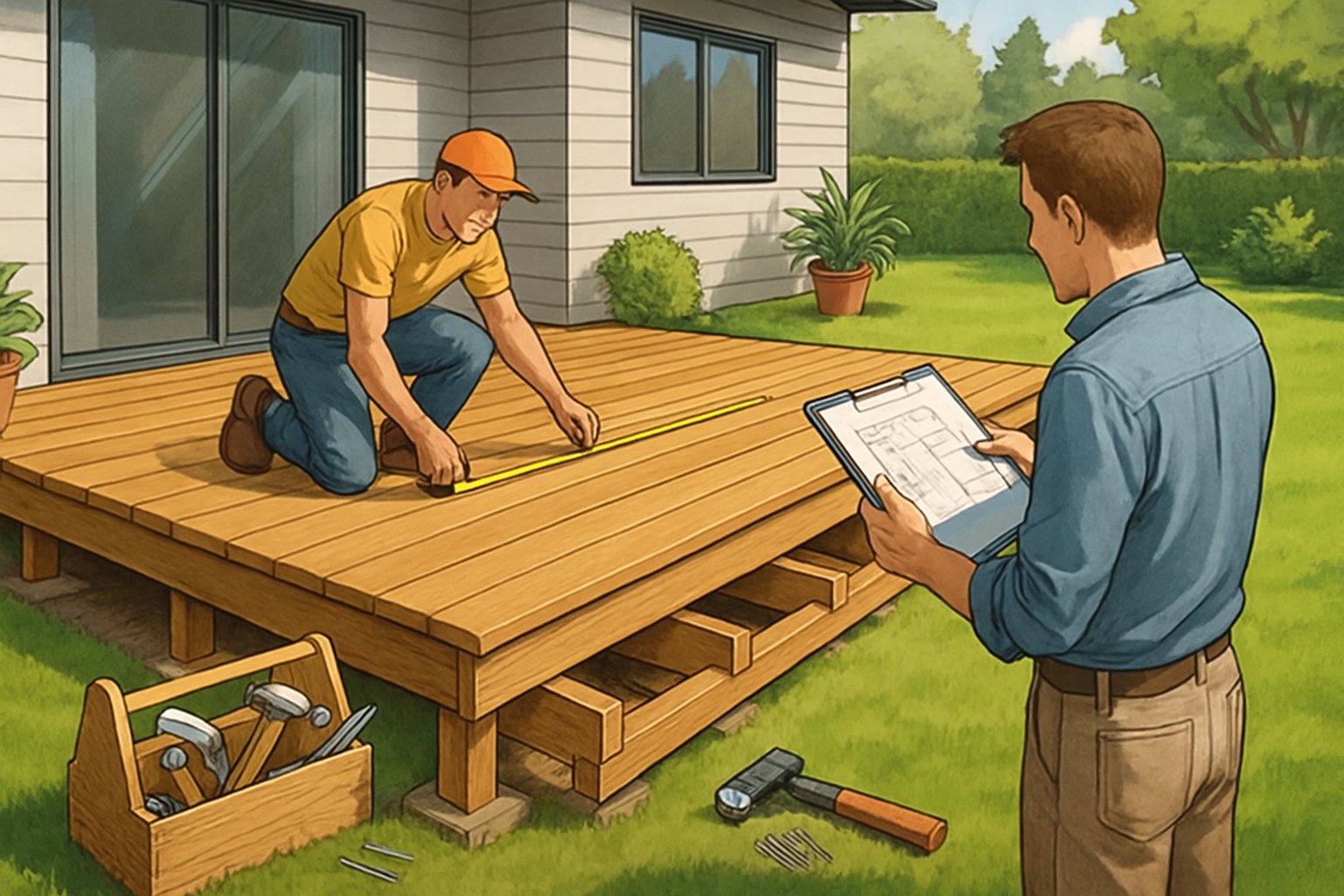
The final price tag? That depends on a bunch of things. Deck size matters most, but your choice of materials, how fancy the design gets, and extras like railings or stairs all push the number up or down.
Knowing what drives those costs helps you make better decisions and avoid sticker shock.
Need a Home Fix – Emergency or Routine?
From leaks and no-heat nights to simple tune-ups, our 24/7 hotline connects you with trusted local pros in minutes.
Key Takeaways
- New decks cost anywhere from $4,400 to $12,000 on average, or $30 to $60 per square foot
- Size is the biggest cost factor—bigger decks mean more materials and labor
- Material choices matter a lot, from budget-friendly pressure-treated wood to splurge-worthy composites
Average Cost Of Building A New Deck
Most people shell out between $4,000 and $12,000 for a new deck. The average lands right around $7,500, but your price will depend on deck size, materials, and local labor rates.
National Price Ranges
Across the U.S., deck installation usually runs from $4,141 to $11,713. The national average is about $7,500 for a pretty standard deck.
If you’re pinching pennies, you can get a basic deck for as little as $4,000. That’s usually pressure-treated lumber and a no-frills design.
Mid-range decks cost $6,000 to $9,000, often with upgraded materials or some added style.
Want to go all out? High-end decks can hit $12,000 or more, especially with composite materials or complicated layouts.
Where you live plays a big role too. High cost-of-living areas tend to have pricier deck builds, no surprise there.
Cost Per Square Foot
Deck installation runs $20 to $50 per square foot, including materials and labor.
Pressure-treated wood decks are the cheapest, at $20 to $30 per square foot. That’s about as affordable as it gets.
Cedar or composite decking lands in the $30 to $40 per square foot range. You’ll get better looks and durability for the price.
Premium stuff like exotic hardwoods or top-tier composites? Expect $50 per square foot or even more.
A 300-square-foot deck usually costs $6,000 to $12,000. Labor alone can be $8 to $22 per square foot, depending on who you hire.
Factors That Influence Pricing
Deck size is the main thing—bigger decks mean more of everything, period.
Material choice can swing your budget a lot. Pressure-treated wood is cheap, composites and hardwoods are not.
Design complexity makes a difference. Multi-level decks, fancy shapes, or built-in features always bump up the price.
Site conditions can mess with your budget. Sloped yards or tough access mean more work (and more money).
Local permits and building codes sometimes add fees. Some towns are stricter than others.
Contractor experience matters too. Skilled pros charge more, but you usually get what you pay for.
Deck Size And Design: How They Affect Cost
Deck size is a huge deal for cost. Bigger decks need more materials and labor, no way around it.
If you want a custom design or multiple levels, expect to pay extra for the added work and skills required.
Standard Deck Sizes And Price Estimates
Most people pick decks between 200 and 500 square feet. A simple 12×16 deck (192 sq ft) usually costs $3,800 to $11,500, depending on the material.
Common Deck Sizes and Cost Ranges:
| Deck Size | Square Feet | Cost Range |
|---|---|---|
| 10×12 | 120 sq ft | $2,400 – $7,200 |
| 12×16 | 192 sq ft | $3,800 – $11,500 |
| 16×20 | 320 sq ft | $6,400 – $19,200 |
| 20×24 | 480 sq ft | $9,600 – $28,800 |
Pressure-treated lumber costs $20-30 per square foot installed. Composite materials are pricier, running $35-50 per square foot.
Small decks under 200 sq ft are cozy, good for a couple of chairs and a grill. Medium decks (200-400 sq ft) suit most families. Anything over 400 sq ft gives you a real outdoor living room vibe.
Multi-Level Decks And Custom Features
If you want a multi-level deck, plan to pay 25-50% more than for a single-level one. More framing, more supports, more money.
Custom features get expensive fast. Built-in benches can run $500-1,500 per linear foot. Pergolas? Those start around $1,500 and go up based on size and materials.
Cost Impact of Custom Features:
- Built-in planters: $200-800 each
- Custom railings: $15-50 per linear foot
- Curved edges: $5-10 extra per square foot
- Multiple access points: $300-800 per staircase
Complex designs need skilled carpenters, and they don’t come cheap. The more unusual the shape, the more you’ll pay. If you stick to rectangles and right angles, you’ll save some cash.
Ground-Level vs Second-Story Decks
Ground-level decks are usually cheaper. They need less foundation work and shorter posts, so materials and labor both drop.
Second-story decks are a whole different animal. You’ll need deeper footings, taller posts, and extra bracing. Just the foundation can add $2,000-5,000 to your bill.
Key Cost Differences:
- Foundation: Ground-level uses 2-3 foot footings; elevated decks need 6-8 feet
- Railings: Second-story decks require full perimeter railings
- Access: Elevated decks mean longer, more complex stairs
Labor costs go way up for elevated decks. There’s more setup, more safety gear, and just more hassle all around. Permits can cost more too, thanks to stricter codes for anything off the ground.
Decking Materials And Their Cost Differences
Material choice is a biggie for both upfront and long-term costs. Pressure-treated wood is the cheapest—about $12 per square foot for materials. Composite decking costs more but saves you on maintenance down the road.
Pressure-Treated Wood
Pressure-treated wood is still the go-to for budget decks. Materials cost around $12 per square foot, give or take.
Manufacturers treat PT lumber with chemicals to fight rot and bugs, so it lasts longer outside than regular wood.
Cost Benefits:
- Lowest material costs by far
- Easy to find at any lumber store
- Simple to install, even for DIYers
It’s a solid pick if you’re watching your wallet. You can stain or paint it to match your house, and if you keep up with maintenance, it’ll last a long time.
Honestly, it’s not glamorous, but it gets the job done for most people.
Composite Decking And Trex Decking
Composite decking costs more upfront, but you’ll save on maintenance. Materials alone cost more than pressure-treated wood, that’s for sure.
These boards mix wood fibers and plastic, so they won’t fade, stain, or warp like regular wood.
Popular Composite Brands:
- Trex decking—probably the most recognized, with lots of color choices
- TimberTech—premium feel, looks a lot like real wood
- Fiberon—mid-range price, still pretty durable
Trex even offers a 25-year warranty. No need to stain or seal it, ever. Composite decks shrug off scratches and stains, and cleaning is easy—just soap and water.
You might pay a little more for installation since some brands need special fasteners, but you’ll barely have to touch it for years after.
Cedar, Redwood, And Bamboo Options
Cedar costs more than pressure-treated wood but less than high-end composites. Its natural oils help it resist bugs and decay.
Redwood is gorgeous and tough, but it’s pricey. It’s got that rich color people love, and it stands up well to the weather.
Natural Wood Characteristics:
- Cedar: Lightweight, naturally resists rot
- Redwood: Deep color, really durable outdoors
- Bamboo: Fast-growing and sustainable—kind of trendy, honestly
Bamboo decking is an eco-friendly pick. It naturally keeps out moisture and pests, but you’ll need to maintain it just like other woods.
All these need regular sealing and staining. If you’re willing to put in the work, they’ll look great for years.
Cedar and redwood give you that premium, natural look without the cost of composites. Perfect if you want something classic and warm.
Material Lifespan And Maintenance Needs
Every deck material comes with its own care routine and lifespan. Knowing this stuff helps you figure out what you’re really signing up for.
Material Lifespans:
- Pressure-treated wood: 15-20 years (if you keep up with maintenance)
- Composite decking: 25-30 years with barely any upkeep
- Cedar: 20-25 years if you take care of it
- Redwood: 25-30 years with regular maintenance
Wood decks need staining every couple of years, which adds to your costs over time.
Composite decks? Just give them a wash now and then. No staining or sealing needed, ever.
Bamboo lasts 20-25 years if you clean and refinish it occasionally. It’s not quite set-and-forget, but it’s not bad.
Maintenance adds up, so don’t ignore it when you’re picking materials. It’s easy to forget until you’re out there sanding in the summer heat.
Labor Costs And DIY vs Professional Installation
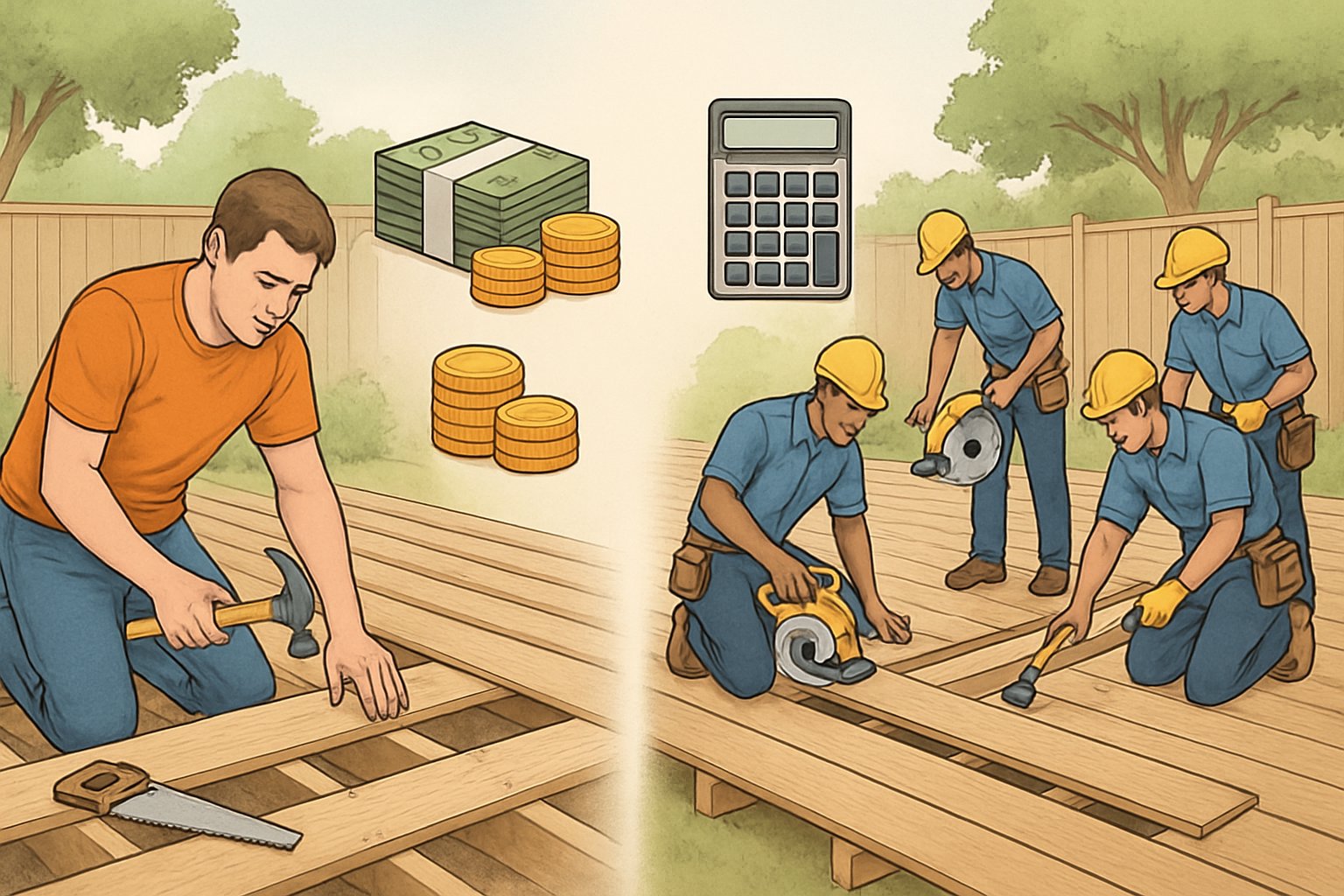
Labor usually drives the biggest cost gap between DIY and hiring pros for deck installation. If you go with professionals, expect to pay $4,500 to $10,500 in labor alone.
DIY builders can skip these labor charges but, wow, it takes a lot of time and at least a bit of skill.
Labor Cost Breakdown
Deck contractors typically charge $15 to $35 per square foot for labor. Your final rate depends on how tricky your project is and what local rates look like.
For a 300-square-foot deck, you’re looking at $4,500 to $10,500 just for labor. Add built-in benches or multi-level designs and the price climbs higher.
Labor costs usually include:
- Site prep and foundation work
- Framing and structure
- Decking board installation
- Building railings and stairs
- Cleanup and final walkthrough
Contractors often finish in one to two weeks, weather and permits permitting.
They bring specialized tools and handle the permit process, plus make sure everything’s up to code.
DIY Deck Installation Considerations
DIY lets you keep that $4,500 to $10,500 in your pocket, but the trade-off is your time and effort.
Most folks spend a few weekends on a basic deck, but complicated designs can drag on for months.
DIY projects need:
- Tools (rented or bought, $200 to $800)
- Learning construction basics
- Getting permits yourself
- Coordinating material deliveries
Messing up can be costly—structural mistakes might mean safety risks or expensive fixes later.
DIYers also give up the warranty that comes with pro installation, so future repairs are all on you.
If you’ve built stuff before, DIY feels more doable. First-timers often bite off more than they expect.
Choosing A Deck Contractor
Pros bring expertise, warranties, and usually finish faster than most DIYers.
Check out local contractors with solid reviews and ask for references from recent jobs.
Make sure your contractor has:
- Up-to-date licensing and insurance
- Knowledge of local building codes
- Reliable material suppliers
- Clear, written estimates
Get several quotes to compare labor, materials, and timelines.
Some contractors get materials at wholesale prices, which can soften the blow of labor costs.
Good pros handle permits and make sure your deck passes inspection without a hitch.
Deck Foundation, Site Preparation, And Permits
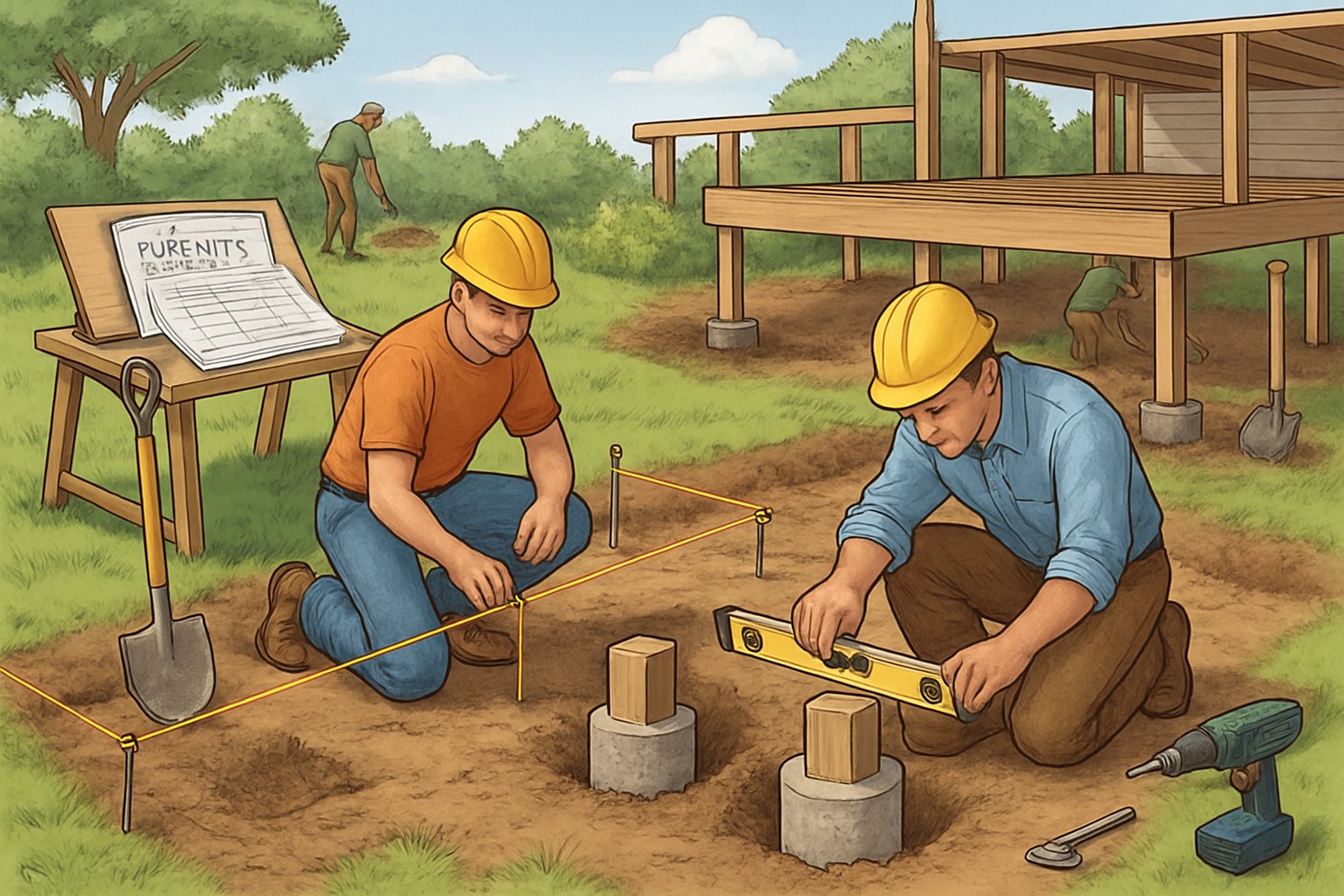
Every deck needs a solid foundation, proper site prep, and the right permits. These steps add $500 to $3,000 to your total, but skipping them isn’t worth the risk.
Types Of Deck Foundations
Concrete piers are the usual pick for decks. At $15 to $25 per pier, they offer stability for most sizes.
If your soil’s unpredictable, helical piers might be better. They cost $150 to $300 each and handle tough ground.
Larger decks often need concrete footings, which run $50 to $150 each, depending on how deep and wide they need to be.
For low, ground-level decks, concrete blocks or gravel pads do the trick. These are cheaper—think $5 to $15 per support.
Foundation costs depend on:
- Soil type
- Deck size and weight
- Frost line depth in your area
- How many supports you need
Most builders space supports every 6 to 8 feet. Typical decks use 6 to 12 supports.
Site Preparation Costs
Site prep usually costs $2 to $5 per square foot. That covers clearing plants, leveling the ground, and marking utilities.
Clearing away trees and grass costs $100 to $300 for most jobs.
Leveling a gentle slope might cost $300 to $800, but major grading can run $1,500 to $3,000.
By law, you have to mark utilities before digging. Thankfully, it’s usually free and saves you from some nasty surprises.
Sometimes you’ll need extra drainage—French drains or grading tweaks can add $500 to $2,000.
Rocky or wooded sites cost more to prep, sometimes double or triple the usual price.
Permit And Inspection Fees
Building permits for decks usually cost $50 to $150. If you want a covered or fancy deck, expect higher fees.
Permit fees are often a percentage of your project’s value. For a $10,000 deck, you might pay around $125 for the permit.
Most places require permits for decks over 30 inches high or attached to your house. Small, freestanding decks sometimes don’t need one.
Inspection fees are $50 to $200 per visit. You’ll probably have two: one for the foundation and one at the end.
Permits can take 1 to 3 weeks to process, though some towns offer rush service for a fee.
You’ll need to submit:
- Site plans
- Foundation details
- Material specs
- Structural calculations for big decks
Upgrades, Add-Ons, And Long-Term Maintenance Costs
Building a deck is just the start—upgrades and yearly upkeep add up, too. Railing upgrades and custom touches can run $500 to $5,000, and annual maintenance is usually $200 to $800, depending on your materials.
Deck Railing And Custom Features
Basic wood railings cost $15 to $35 per linear foot. If you want composite, it jumps to $25 to $50 per foot.
Aluminum railings cost $40 to $80 per foot, while sleek cable railings can hit $60 to $120 per foot.
Add-ons get pricey fast:
- Built-in benches: $300 to $800 each
- Pergolas: $2,500 to $8,000
- Fire pits: $1,500 to $4,000
- Outdoor kitchens: $5,000 to $25,000
Lighting and electrical work adds $500 to $2,500. Most pros charge $50 to $100 per hour for these upgrades.
Deck Repair And Replacement Costs
Minor repairs—think loose boards or nails—run $200 to $800. Swapping out damaged boards is $10 to $25 per square foot.
Big structural fixes can cost $1,000 to $5,000. Replacing support posts? That’s $200 to $500 each.
Wood decks usually need replacing after 15 to 25 years. Composites last longer—25 to 30 years before you’ll need a new one.
Watch for these signs it’s time to replace:
- Saggy or bouncy boards
- Rotten beams
- Loose or missing fasteners
- Widespread board damage
Ongoing Maintenance Expenses
Wood decks need yearly cleaning and a fresh coat of stain every 2 or 3 years. Hiring a pro to stain costs $2 to $4 per square foot.
If you do it yourself, expect to spend $100 to $300 a year on supplies like cleaner, stain, and brushes.
Composite decks are easier, but still need a good wash once a year. Power washing services run $200 to $400 per session.
Here’s a quick maintenance checklist:
- Spring: Sweep off debris and check for any damage
- Summer: Clean up spills fast and inspect railings
- Fall: Clear leaves and add protective treatments
- Winter: Shovel off snow and keep ice away
Frequently Asked Questions
Most homeowners want a ballpark cost for their deck and what makes the price swing. Labor usually runs $15–25 per square foot, but total costs depend on deck size, materials, and where you live.
What is the average labor cost to build a deck per square foot?
Labor alone usually falls between $15 and $25 per square foot. That covers framing, decking, and railings.
Labor makes up about half the total project cost. If you want a multi-level deck or custom extras, labor will be higher.
Where you live matters—a high cost of living can push labor rates to $25–35 per square foot.
What are the estimated expenses for constructing a 14×20 deck?
A 14×20 deck (280 square feet) typically costs $5,600 to $16,800. The range depends on your materials and how fancy your design gets.
Pressure-treated wood keeps things affordable at $5,600–$8,400. Composite decking bumps the price to $11,200–$16,800.
Add-ons like benches or pergolas can tack on $2,000–$5,000. Tricky site conditions might also boost your total.
How do you calculate the cost of building a deck on your own?
DIY saves you labor costs, but you’ll need to add up all your materials and permit fees. Measure your space and multiply by the per-square-foot material cost.
Pressure-treated wood runs $8–$15 per square foot for materials. Always buy 10–15% extra for mistakes or waste.
Budget $200–$500 for tool rentals if you don’t own what you need. Permits usually cost $100–$500, depending on your city.
What is the typical spending range for a 20×20 deck construction?
A 20×20 deck (400 square feet) costs $6,000 to $20,000 with professional installation. Materials make the biggest difference.
Pressure-treated lumber keeps costs at $6,000–$12,000. Composite jumps to $12,000–$20,000.
Premium woods or PVC can go over $20,000. More complex designs with stairs and railings add $2,000–$4,000.
What is the cost per square foot for a pressure-treated deck?
Pressure-treated decks cost $20–$35 per square foot, including materials and labor. It’s usually the most budget-friendly option.
Materials alone are $8–$15 per square foot. Labor adds another $12–$20 per square foot.
Don’t forget upkeep: staining every 2–3 years can run $500–$1,000 a year over time.
Are there variations in deck construction costs based on location?
Location plays a big role in deck construction costs, mostly because of labor rates and whether materials are easy to get. Urban areas? Yeah, they usually run 20-40% pricier than rural spots.
If you’re in a high-cost area like California or New York, you might see prices hit $35-$60 per square foot. Meanwhile, in the Midwest or the South, you’re more likely looking at $20-$40 per square foot.
Local building codes can really shake things up too. Some places want engineered plans, which can tack on another $500-$2,000 to your bill.
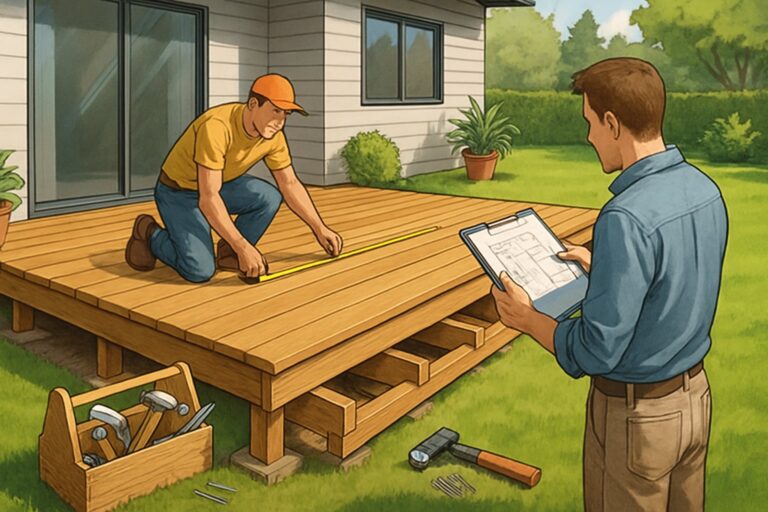

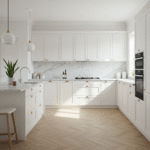



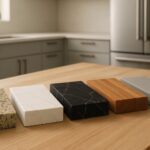
Leave a Reply